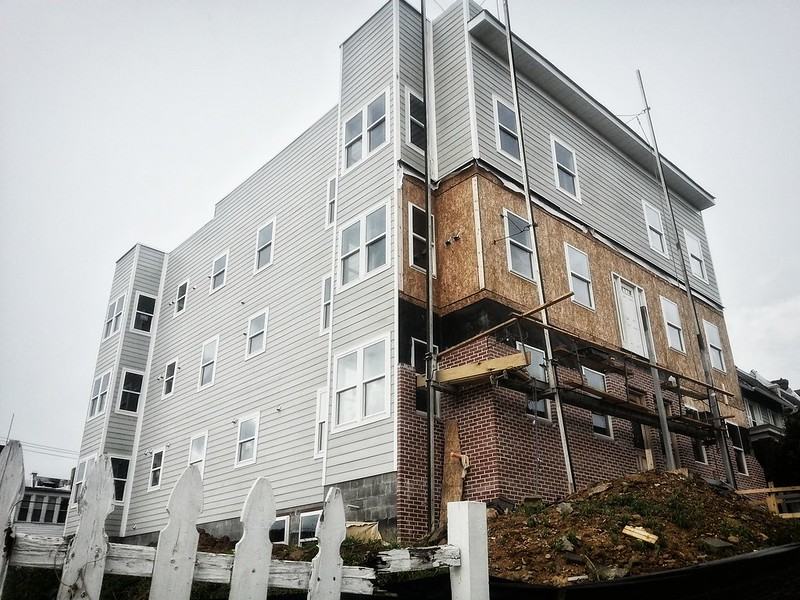This article was first published by DCist on May 24.
As part of her goal to construct thousands of new homes across the city by 2025, D.C. Mayor Muriel Bowser is seeking to invest an additional $400 million into affordable housing over the next two years.
The mayor announced Monday that her supplemental budget for this fiscal year will add $150 million to the Housing Production Trust Fund, the city’s primary vehicle for affordable housing financing. Bowser is also calling for $250 million in the fund in 2022 — the District government’s largest annual investment in affordable housing to date, if it’s approved by the D.C. Council.
The investment could generate an additional 2,700 affordable homes, according to the mayor.
“You know affordable housing is my baby,” the mayor said to developers, housing advocates, and officials who gathered to hear her announcement at the Spring Flats development in Ward 4 on Monday morning.
Affordable housing advocates welcomed the news that Bowser is also seeking to boost the city’s Local Rent Supplement Program (LRSP) for households earning at or below 30% of the region’s median family income, equal to about $39,000 annually for a family of four. LRSP vouchers can be used to provide rent subsidies to low-income tenants in developments financed by the Housing Production Trust Fund.
Big news to start the week! The most impt part of this announcement is that the Mayor is pairing her HPTF investment with project-based rental assistance to keep units affordable to families with the lowest incomes. The amount of that latter investment is unknown. #JustRecoveryDC https://t.co/wN7Y6WlZJ8
— Doni Crawford ????????????✊???? (@DoniCrawford) May 24, 2021
According to the mayor’s office, part of the $400 million investment will help construct 462 net new affordable housing units and preserve another 175 affordable homes across eight different projects. Half of those projects are located in Ward 8. Rental units financed by the Housing Production Trust Fund must be maintained as affordable for 40 years.
In 2019, the mayor announced an ambitious goal to build 36,000 homes by 2025, with a third of them affordable to low- and moderate-income residents. The administration had reached about 20% of its affordable housing goal as of April, according to city data.

In 2019, the left-leaning D.C. Fiscal Policy Institute implored the mayor to double the annual $100 million in housing funds, saying the trust has become less valuable each year as construction costs have gone up.
Some activists used Monday’s announcement as an opportunity to urge the mayor to cancel rent for residents who lost income during the pandemic. Bowser continues to face criticism over the administration’s rollout of its Stay DC rental assistance program, which began distributing $352 million in federal relief to tenants last week. Advocates say the program’s online application is difficult to access without a computer and requires extensive documentation that many renters don’t have.
Others pointed out that $400 million is not enough to prevent displacement of low-income D.C. residents. A 2015 study by the Urban Institute estimated that the city would need to invest between $3.1 and $5.2 billion in affordable housing to meet its needs through 2020.
While Bowser talked up her budget request in front of the Spring Flats development, Councilmember Robert White (D-At Large) announced he’s introducing legislation that would preserve existing rental units in D.C. as affordable housing. The Generating Affordability in Neighborhoods (GAIN) Act would allow the city to place temporary affordability requirements on privately owned rental units in exchange for subsidies. Residents who earn less than 30% or 50% of the Washington area’s median family income would qualify for housing under a covenant.
As proposed, the bill is similar to the city’s DOPA law, which grants the city an opportunity to purchase and preserve affordable homes before they’re sold to private developers.
Last year, both housing advocates and the Bowser administration expressed concerns that the coronavirus pandemic would force the city to slash spending on affordable housing, citing potentially huge revenue losses. But those fears have gone mostly unrealized. The District wrapped the 2020 fiscal year with an unexpected budget surplus, and the CFO’s latest 2022 revenue estimates look surprisingly rosy.
By law, the District is required to dedicate half of any annual budget surplus to the HPTF, once reserves are replenished.
After the mayor releases her proposed budget this week, D.C. Council committees will hold budget oversight hearings, followed by a markup of the budget.








